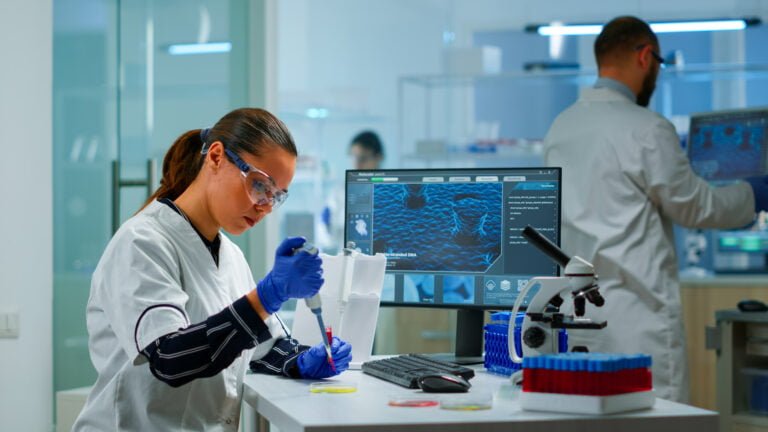18 Biotechnology Career: Exploring a Wide Range of Opportunities
18 Biotechnology Career: Exploring a Wide Range of Opportunities
Table of Contents
Toggle
Introduction
Introduction
For those with a passion for scientific research, innovation, and having a beneficial impact on society, the discipline of biotechnology provides a wide range of professional prospects. From assay analysts to biotechnology professors, clinical research managers to geneticists, professionals in biotechnology contribute to advancements in various sectors, including pharmaceuticals, healthcare, agriculture, and forensic science. We will examine different biotechnology career options in this post, along with their duties and responsibilities, and give a general idea of the pay scales for these occupations.
18 Biotechnology
Career: Unveiling the Possibilities
18 Biotechnology Career: Unveiling the Possibilities
In the diverse discipline of biotechnology career, biological concepts and methods are used to create novel goods and procedures. It encompasses various sectors, including pharmaceuticals, agriculture, environmental science, and healthcare. The biotechnology sector employs professionals who continuously work to expand scientific discovery, create life-saving pharmaceuticals, increase crop yields, and tackle urgent global concerns.
The
Journey Begins: Education and Training
The Journey Begins: Education and Training
The Path to Success in Biotechnology career: Biotechnology Degree Programs
To embark on a successful biotechnology career, a solid educational foundation is essential. Numerous colleges and universities provide students with in-depth knowledge of the topic by offering specialised degree programmes in biotechnology. Coursework in molecular biology, genetics, biochemistry, microbiology, and other pertinent fields is generally included in these programmes. Students also gain hands-on laboratory experience, honing their practical skills and critical thinking abilities.
Beyond the Bachelor’s Degree: Advanced Studies and Specializations
People have the option to attend specialised careers in the field of biotechnology in fields like genetics, drug research, or bioinformatics. Graduate programmes like the Master’s and Ph.D. enable aspiring professionals to delve deeply into their chosen disciplines and obtain cutting-edge knowledge and abilities, opening up these specialisation opportunities. These programs explore deeper into research methodologies, data analysis, and scientific writing, equipping individuals with the expertise required for leadership roles and cutting-edge research.
18 Biotechnology
Career Opportunities: Exploring the Pathways
18 Biotechnology
Career Opportunities: Exploring the Pathways
18 Biotechnology Career Opportunities: Exploring the Pathways

1. Research Scientist
1. Research Scientist
Research scientists form the backbone of the biotechnology career field. They conduct experiments, analyze data, and interpret results to further scientific understanding and develop innovative solutions. In the diverse discipline of biotechnology, biological concepts and methods are used to create novel goods and procedures.
2. Biomedical Engineer
2. Biomedical Engineer
To create medical equipment, prosthetics, and diagnostic tools, biomedical engineers combine their understanding of biology, medicine, and engineering pronciples. They are essential in strengthening the delivery of healthcare and the standard of patient care.
3. Pharmaceutical Sales Representative
3. Pharmaceutical Sales Representative
Pharmaceutical sales representatives bridge the gap between biotechnology companies and healthcare providers. They promote and sell pharmaceutical products, ensuring that healthcare professionals are aware of the latest advancements and benefits of biotechnology-derived medications.
4. Quality Control Analyst
4. Quality Control Analyst
Quality control analysts ensure that biotechnology products meet stringent quality standards and regulatory requirements. They perform tests, analyse samples, and monitor manufacturing processes to maintain product safety and efficacy.
5. Bioinformatics Specialist
5. Bioinformatics Specialist
Bioinformatics specialists apply computational techniques to analyse biological data, such as DNA sequences and protein structures. They develop algorithms and software tools that aid in data interpretation, enabling breakthroughs in genomics, drug discovery, and personalized medicine.
6. Pharmaceutical and
Biopharmaceutical Industry
6. Pharmaceutical and Biopharmaceutical Industry
The pharmaceutical and biopharmaceutical industry is one of the primary areas where biotechnologists find employment. They are involved in discovery, development, and production of new drugs and therapies. Biotechnologists work in research and development, quality control, regulatory affairs, manufacturing, and clinical trials.
7. Agricultural Biotechnology
7. Agricultural Biotechnology
In this field, professionals apply biotechnological techniques to improve crop yield, develop genetically modified organisms (GMOs), and also enhance pest and disease resistance. They are developing sustainable agricultural practices, biofuels, and improving food security.
8. Environmental Biotechnology
8. Environmental Biotechnology
Environmental biotechnology focuses on using biological processes to solve environmental problems. Biotechnologists in this field work on developing and implementing technologies for wastewater treatment, pollution control, and remediation of contaminated sites.
9. Medical and Clinical
Research
9. Medical and Clinical Research
Biotechnologists contribute significantly to medical and clinical research by conducting experiments, analysing data, and developing innovative medical technologies. They cooperate with medical professionals in academic institutions, research facilities, and hospitals to develop medical knowledge and enhance patient care.
10. Forensic Biotechnology
10. Forensic Biotechnology
Forensic biotechnology involves the application of biotechnological techniques in crime scene investigation, DNA analysis, and forensic identification. Biotechnologists in this field work closely with law enforcement agencies and forensic laboratories to provide scientific evidence for criminal investigations.
11.Assay Analyst
11.Assay Analyst
Assay analysts play a crucial role in biotechnology and pharmaceutical companies. They are in charge of running tests and examining samples to evaluate the efficacy and calibre of medicines, vaccines, and other biotechnological products.
Chromatography and spectrophotometry are just two of the methods used by assay analyzers to assess the concentration and purity of substances.
12.Biotech Consultant
12.Biotech Consultant
Biotech consultants provide expert advice and guidance to biotechnology companies, research institutions, and organizations in the industry. They offer strategic insights, market analysis, and regulatory compliance recommendations. Biotech consultants work on a project basis, assisting clients in areas such as product development, commercialization, and business expansion. The salary range for biotech consultants can vary widely, depending on experience, expertise, and the nature of the projects undertaken.
13.Biotechnology Professor
13.Biotechnology Professor
Biotechnology professors play a vital role in academia, teaching and conducting research in the field. They educate and mentor students, design and deliver coursework, and contribute to scientific advancements through their research projects. Biotechnology professors often have advanced degrees, such as Ph.D., and may work in universities or research institutions.
14.Clinical Research
Manager
14.Clinical Research Manager
Clinical research managers oversee and coordinate clinical trials and research studies conducted in healthcare and pharmaceutical settings. They ensure compliance with ethical guidelines, manage research teams, analyse data, and report findings. Clinical research managers play important role in the development and evaluation of new drugs and therapies.
15.Epidemiologist
15.Epidemiologist
Public health specialists known as epidemiologists research the distribution, aetiology, and consequences of diseases in populations. They examine health statistics, look into epidemics, and create plans for illness prevention and management. Epidemiologists are essential in maintaining public health and developing therapies to lessen the effects of chronic diseases and infectious diseases.
16.Facilities Manager
16.Facilities Manager
Facilities managers in biotechnology oversee the operations and maintenance of research facilities and laboratories. They ensure compliance with safety regulations, manage equipment and resources, and coordinate facility maintenance and upgrades. In order to provide scientists and researchers with a secure and productive working environment, facilities managers are essential.
17.Geneticist
17.Geneticist
Geneticists study genes, heredity, and genetic variation to understand how traits and diseases are passed down through generations. They conduct research, analyze DNA samples, and contribute to advancements in fields such as personalized medicine, agricultural genetics, and genetic engineering. Geneticists may work in academic institutions, research organizations, or government agencies.
18.Plant Breeder
18.Plant Breeder
Plant breeders use biotechnological methods to increase disease resistance, increase agricultural yields, and create new plant kinds. They are employed by businesses that produce seeds, do agricultural research, and engage in biotechnology. Plant breeders promote agricultural practises, sustainability, and the availability of food.

Additional Biotechnology
Career Paths
Additional Biotechnology Career Paths
In addition to the roles mentioned above, there are numerous other biotechnology career paths available in the biotechnology industry. Here are a few more examples:
- Biostatistician
- Environmental Health and Safety Officer
- Bioprocess Engineer
- Product Manager
- Pharmaceutical Manufacturer
- DNA Analyst
- Microbiologist
- Biomedical Equipment Technician
Conclusion
Conclusion
A career in biotechnology offers a dynamic and fulfilling journey for individuals passionate about science, innovation, and making a positive impact on society. With a strong educational foundation, specialized knowledge, and a commitment to lifelong learning, you can embark on a path that fosters groundbreaking discoveries and transforms lives. Whether you choose to delve into research, engineering, sales, or any other biotechnology career path, the possibilities are limitless. So, take the first step, unleash your potential, and contribute to the exciting world of biotechnology.
FAQs
About Biotechnology Careers
FAQs About Biotechnology Careers
Q: Are there opportunities for career growth in biotechnology?
A: Yes, biotechnology offers excellent opportunities for career growth. With continuous learning, specialization, and gaining experience, biotechnologists can progress to higher-level positions, take on leadership roles, and contribute to groundbreaking research and innovation.
Q: What are the educational requirements for a biotechnology career?
A: The educational requirements for a biotechnology career vary depending on the specific role and level of responsibility. The average entry-level qualification is a bachelor’s degree in biotechnology or a closely related discipline, though higher levels of education such a master’s or Ph.D.
Q: What skills are crucial for a successful biotechnology career?
A: Successful biotechnologists possess strong analytical and problem-solving skills, proficiency in laboratory techniques, effective communication abilities, and a passion for continuous learning and innovation.
Q: How does biotechnology contribute to the advancement of medicine?
A: New medications and cures are discovered and developed in large part because to advances in biotechnology. It enables the identification of disease targets, the design of more effective treatments, and the production of biopharmaceuticals that revolutionize patient care.
Q: What is the average salary for biotechnology careers?
A: The average salary in the biotechnology industry varies depending on the specific job role, level of experience, and geographic location. However, biotechnology careers are generally known for offering competitive salaries and excellent growth potential.
Q: Are there ethical considerations in biotechnology?
A: Due of the potential impact on society, the environment, and human health, ethical issues are of utmost importance in biotechnology.
To ensure ethical technology usage, human and environmental well-being, and responsible technology use, biotechnologists follow strict ethical standards.
Q: What are the emerging trends in biotechnology?
A: Some of the emerging trends in biotechnology include gene editing technologies like CRISPR, personalized medicine, synthetic biology, and the application of artificial intelligence and machine learning to analyse biological data.
Q: How can one stay updated with the latest advancements in biotechnology?
A: Staying updated in the rapidly evolving field of biotechnology is crucial. Professionals can join industry associations, attend conferences and workshops, read scientific journals, and engage in continuous learning through online courses and webinars.

Dear sir above provided information related my bio process career it helpful thanks for sharing your knowledge.
kindly provide article on bio Pharma FAQs
Thanks manoj for your valuable comment. Sure, I will provide the article related to your query.